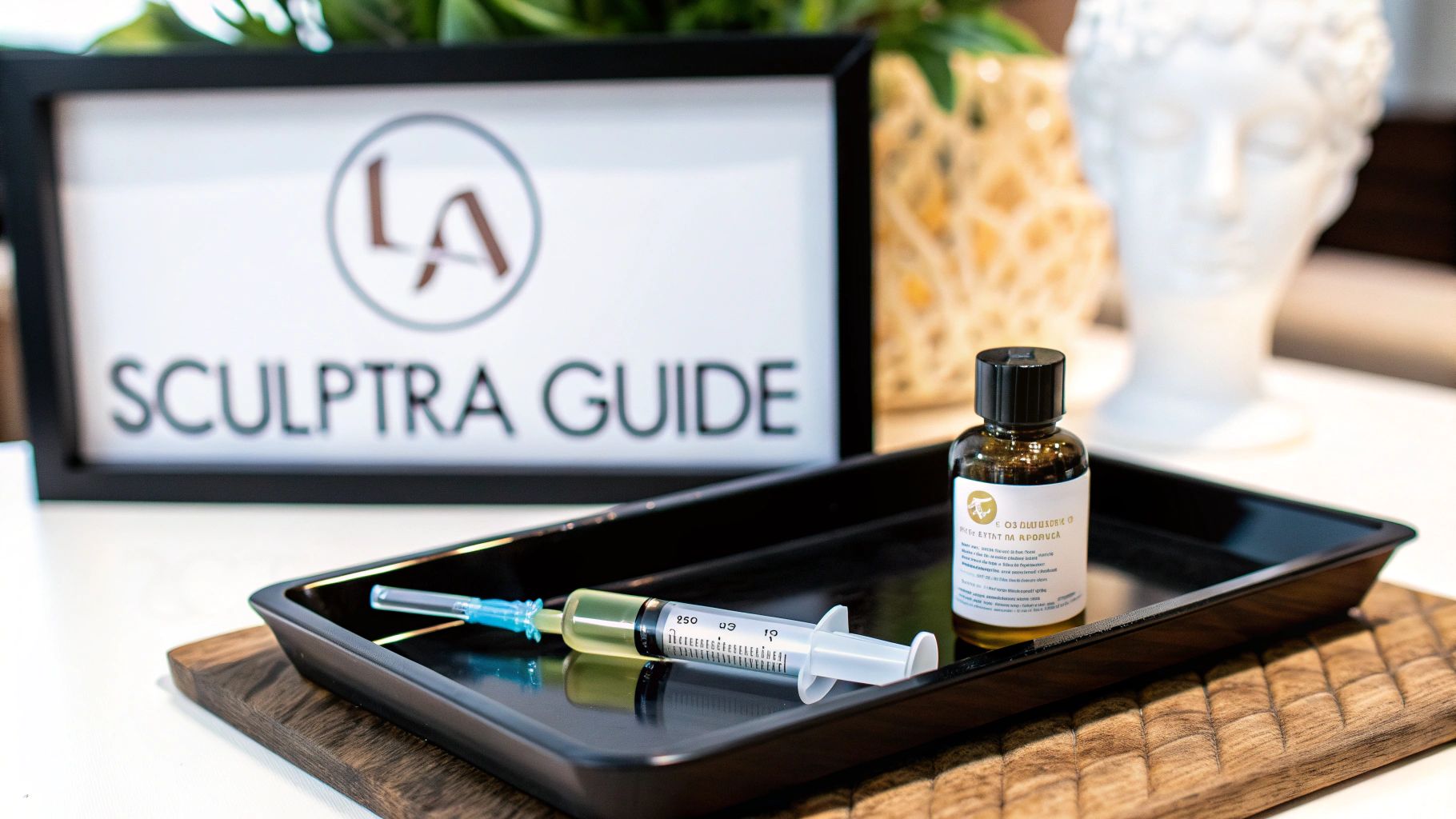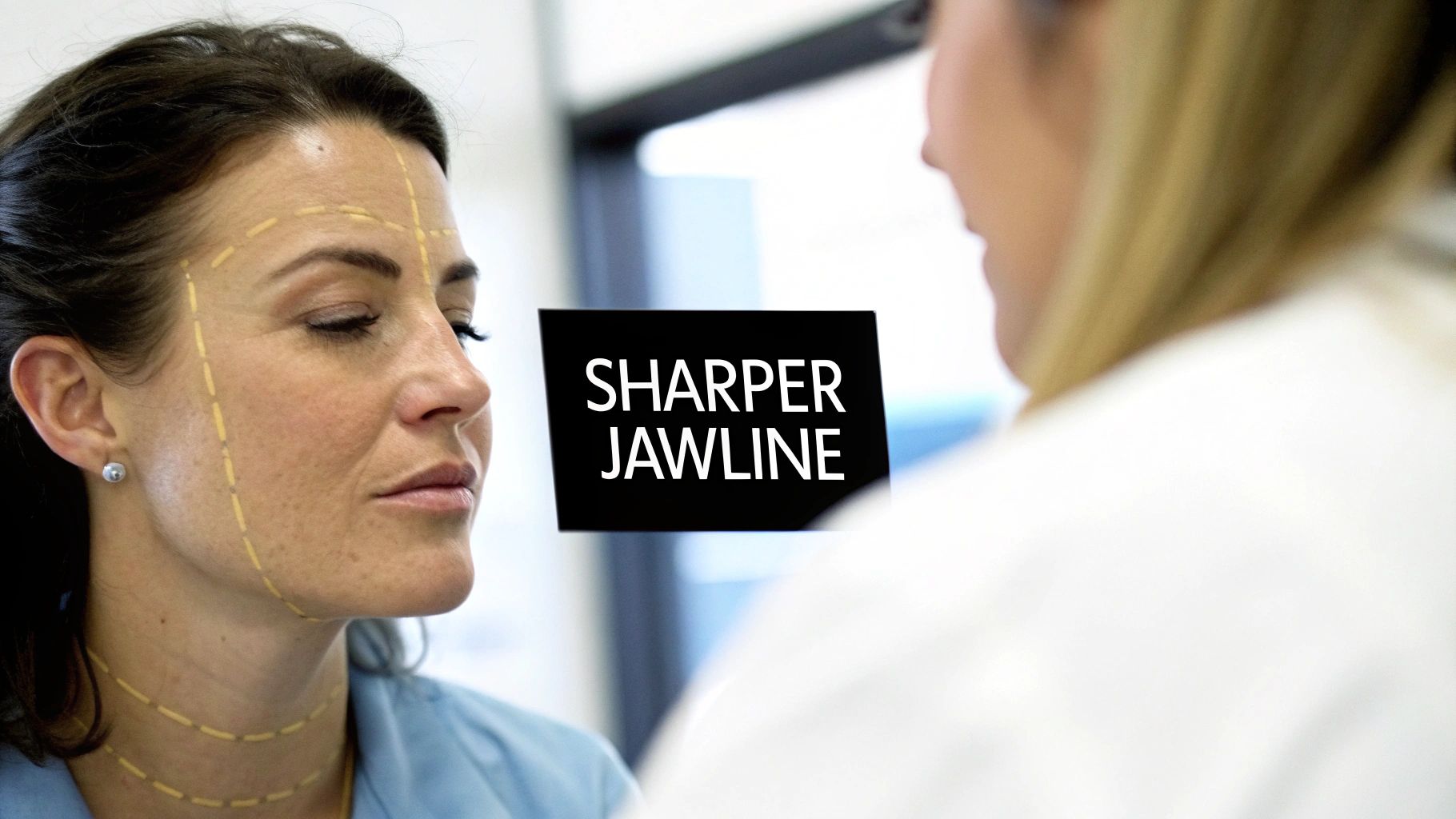
February 15, 2026
What Is Sculptra Treatment A Guide to Rebuilding Your Natural Collagen
What is Sculptra treatment? Explore how this unique collagen stimulator works to gradually restore facial volume for natural, long-lasting rejuvenation.
Oct 3, 2025

A plastic surgery consultation is a pivotal step toward achieving your aesthetic goals safely and successfully. Proper preparation ensures clear communication, realistic expectations, and a trusted relationship with your surgeon. This guide provides essential tips and insights to help you navigate this important appointment with confidence and clarity.

Finding the right surgeon is crucial for safety and achieving your desired results. Start by verifying their board certification, preferably through the American Board of Plastic Surgery or the American Board of Cosmetic Surgery. Certification from these organizations confirms the surgeon has completed specialized training and meets professional standards.
Next, inquire about their experience with your specific procedure. Ask how many times they have performed it and request to see before-and-after photos of previous patients. This helps you evaluate their skill and aesthetic style.
The surgical facility where your procedure will take place should be accredited by reputable organizations such as AAAASF or JCAHO. Certified facilities meet strict safety standards and are staffed by qualified medical teams. Confirm that the anesthetist is experienced, ideally a board-certified anesthesiologist or a certified CRNA.
Your comfort and trust are vital. Schedule consultations with your top choices to discuss your goals, ask questions about risks, recovery, and expected results. Pay attention to how well the surgeon listens and whether they communicate clearly.
Evaluate the office environment for professionalism, cleanliness, and friendliness. Feeling comfortable with the staff and surgeon sets the foundation for a positive experience.
Finally, assess their transparency regarding fees and costs. An honest surgeon will provide clear information and realistic guidance, helping you make an informed decision.
This comprehensive approach ensures you select a qualified, experienced, and approachable surgeon, setting the stage for a successful surgical experience.
For more guidance, search queries like "How to find board certified plastic surgeons and check credentials" can provide additional resources to verify surgeon qualifications and safety standards.

A well-prepared consultation can make a significant difference in your plastic surgery journey. Start by researching the specific procedure you are interested in, understanding techniques, expected results, and potential risks. Reviewing the credentials of your potential surgeon through reputable organizations such as the American Board of Plastic Surgery ensures they are qualified and experienced.
Organizing your medical history is crucial. Bring a comprehensive list of medications, including prescriptions, over-the-counter drugs, supplements, and herbal remedies. Note any allergies, past surgeries, or medical conditions that could influence your suitability for the procedure.
Preparing a list of clear questions is highly recommended. Focus on asking about the surgeon’s experience with the specific procedure, safety protocols, anesthesia, recovery, and what results you can realistically expect. Bringing visual aids like photos or images of your desired outcome helps your surgeon understand your aesthetic goals more effectively (bringing pictures to consultation).
Practical considerations also play an important role. Wear comfortable, easy-to-remove clothing, especially if the procedure involves areas like the face or body where disrobing might be necessary. If you are having outpatient surgery, organize transportation and support for after the procedure (Arrange transportation after surgery). Bringing along relevant documents such as insurance cards or approval forms may streamline administrative aspects.
During your visit, observe the professionalism and cleanliness of the clinic environment. Discuss financial options and clarify costs upfront, including any potential additional charges or financing plans (Discussing financial planning for surgery). Being thoroughly prepared will help you approach your consultation with confidence, ensuring a productive discussion and setting a positive foundation for your surgical journey.
A typical plastic surgery consultation usually lasts between 1 to 2 hours, providing ample time for comprehensive discussion. The process often involves multiple steps, including check-in with front office staff, meeting with a medical assistant or nurse, and then a detailed session with the surgeon. During this meeting, the surgeon will review your medical history, perform a physical exam, and discuss your aesthetic goals.
Your full medical history, including any allergies, medications, or past surgeries, will be carefully examined to ensure safety. The physical assessment involves evaluating skin elasticity, facial or body structures, and taking measurements essential for planning the procedure. This exam helps the surgeon determine the most suitable surgical options tailored to your unique anatomy. Preparing for a plastic surgery consultation and facial cosmetic surgery consultation details provide further guidance.
You should openly share your aesthetic objectives and ask about available procedures, including surgical and non-surgical alternatives. A qualified, board-certified surgeon will explain the benefits, risks, and expected results of each option. This discussion helps set realistic expectations and clarifies what can be achieved safely. For recommended questions to ask during your consultation, see Questions to ask your plastic surgeon and essential questions to ask before your plastic surgery procedure.
Viewing before-and-after photos of previous patients with similar concerns provides insight into the surgeon’s style and results. Many surgeons also use advanced imaging technology, such as 3D simulations, to help you visualize potential outcomes, making it easier to choose the best approach aligned with your goals.
Financial transparency is a key part of the consultation. Your surgeon will review costs, including procedure fees, facility charges, anesthesia, and post-operative care. They will also explain financing options and scheduling. For more details on financial planning and consultation fee policies, see Financial planning for cosmetic surgery and consultation fee details. If you decide to proceed, the surgeon will help you set a date for surgery and discuss pre-operative instructions, ensuring readiness for your procedure.
Engaging with your prospective surgeon involves asking about their qualifications, particularly board certification by the American Board of Plastic Surgery. This credential indicates they have completed rigorous training and adhere to high standards. It's also vital to inquire about their experience performing the specific procedure you're considering, including how many cases they have done and viewing before-and-after photos to set realistic expectations.
Discuss the surgeon’s approach to complication management and safety protocols. Ensure the surgical facility is accredited by recognized bodies such as AAAASF or JCAHO and verify details about anesthesia, including whether an anesthesiologist or certified nurse anesthetist (CRNA) will be present.
Questions about the recovery process, post-operative care, costs, and payment options are equally important. Make sure to clarify what the total costs include, and ask about financing if needed.
Finally, assess the surgeon's professionalism, office environment, and communication style. Feeling comfortable and confident in their expertise will help ensure a smooth surgical experience.
During your consultation, focus on the surgeon’s qualifications and whether they are certified by the American Board of Plastic Surgery, which confirms their expertise. Ask detailed questions about the surgical techniques, anesthesia options, and the expected timeframe for recovery.
Reviewing before-and-after photos from past patients with similar concerns helps you gauge the surgeon’s aesthetic style and skill level. It’s also essential to discuss potential risks, complications, and how they are handled.
Understanding the recovery process, including post-operative care, activity restrictions, and follow-up appointments, will help you prepare. Exploring alternative treatments and understanding the costs involved—including any additional expenses—can aid in making an informed decision.
Ensuring transparency about who will perform the surgery and confirming their credentials fosters trust. Preparing these discussion points ensures you get the most out of your consultation and proceed with confidence.
Preparing properly for your procedure is crucial for safe and satisfying results.
Physically, follow your surgeon’s pre-operative guidelines, which often include maintaining a balanced diet rich in vitamins such as Vitamin C, E, zinc, and beta-carotene to promote healing. Staying well-hydrated is equally important, and engaging in suitable exercises can improve your overall fitness—after consulting with your healthcare provider. For detailed guidance, see Preparing for Plastic Surgery Consultation.
Psychologically, it's vital to set realistic expectations. Understand what the procedure can and cannot achieve to avoid disappointment. Managing anxiety is equally important; practice relaxation techniques like deep breathing, meditation, or seek support from friends, family, or a counselor if necessary. Helpful advice can be found in Tips to Prepare for Your Plastic Surgery Consultation.
Financial planning is another key aspect. Research the total costs involved, including surgeon fees, anesthesia, facility charges, and post-op care. Explore financing options, insurance coverage (if applicable), and ensure you have sufficient funds ready for both the surgery and recovery period. For comprehensive financial preparation, refer to Preparing for Your Cosmetic Surgery Consultation.
Building a support system is beneficial; arrange for someone to assist you post-surgery, and prepare your home environment for a comfortable recovery. Stock up on necessary supplies, and follow all postoperative instructions diligently to ensure a smooth healing process. See the Plastic Surgery Checklist for important day-of-surgery and recovery tips.
Combining these physical, emotional, and financial preparations helps ensure that your surgical experience is as safe and positive as possible, setting the stage for the best outcome.
Your plastic surgery consultation is your opportunity to gather vital information, build trust with your surgeon, and clarify your goals. By preparing thoroughly—researching surgeons and procedures, asking informed questions, and understanding the physical, psychological, and financial preparations—you position yourself for a positive experience and a successful outcome. Remember, choosing the right surgeon and having honest communication are key to achieving results that align with your expectations and ensure your safety and satisfaction throughout your plastic surgery journey.

February 15, 2026
What is Sculptra treatment? Explore how this unique collagen stimulator works to gradually restore facial volume for natural, long-lasting rejuvenation.

February 14, 2026
Learn how to tighten facial skin naturally with proven skincare, exercises, and diet. Our guide offers actionable tips for achieving firmer, more youthful skin.

February 13, 2026
Considering Kybella for under chin fat? Learn how it works, what to expect, costs, and if you're a candidate in our complete guide to jawline contouring.